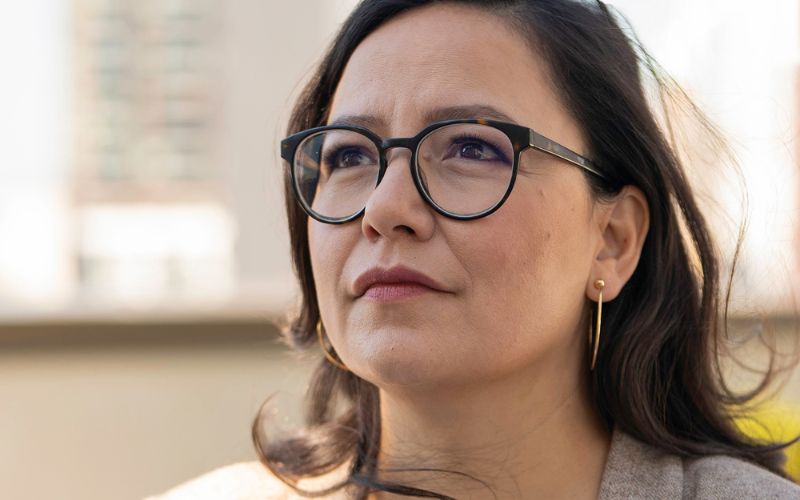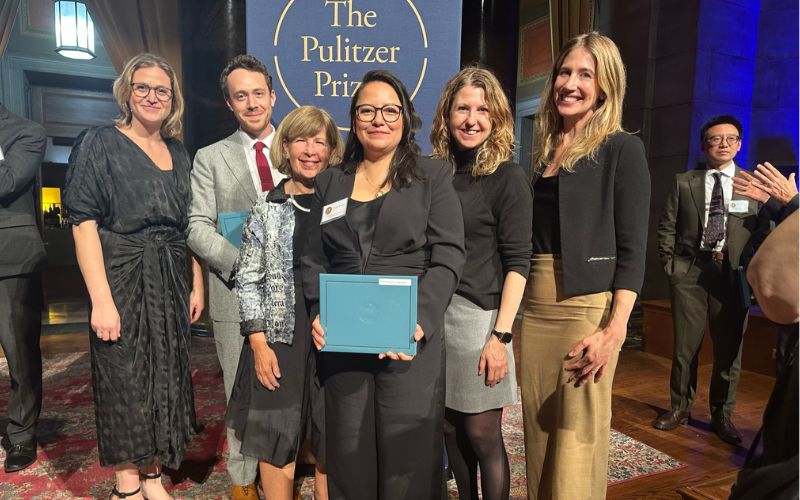
- Details
- By Jenna Kunze
Pulitzer Prize and Peabody Award-winning Indigenous podcast Stolen wrapped its third season this week, its final season with producer Spotify.
Titled “Trouble in Sweetwater”, this season takes listeners to the Navajo Nation to investigate the cases of two missing women: Ella Mae Begay and Kristina Carrillo. The series highlights the disparities and similarities between their cases on the 27,000-square-mile reservation where there are more than tribal police officers.
In October 2022, podcast host Connie Walker, a citizen of the Okanese First Nation in Saskatchewan, and her three-person team began investigating the missing person report of Ella Mae Begay, a 62- year-old Navajo woman who was reported missing by her daughter a year and a half earlier. In the early morning of June 15, 2021, Ella Mae’s daughter called the police to report that a man had broken into her own home and stolen some drinks before wandering off. Before police could show up, she heard her mother’s truck start next door and then drive off. Ella Mae was never seen again.
Through the course of their reporting, the team learned about a second missing woman from a different corner of the Navajo Nation, Kristina Carrillo, whose case tribal police failed to investigate.
Walker, who was named among Time Magazine’s list of the 100 most Influential people of 2024 on April 17, spoke to Native News Online about how season three of “Stolen” developed and what it can teach us as listeners, reporters, and human beings.
This interview has been edited for brevity and clarity.
How do you see each season of “Stolen” in conversation with one another?
“Surviving St. Michael's,” which is season two of Stolen, was such a personal story. It was also historical. We were investigating my dad's experience at a residential school in Saskatchewan. So after we finished that season, I was craving to do something completely [im]personal, but also new. Our team was interested in looking at more contemporary stories, to delve into some of the current issues.
We always want to explore new areas and help to show the diversity that exists within Indigenous communities. And not just the diversity of nations but also the diversity of experiences. examining how the current crisis of violence against women was impacting a single community was something interesting to all of us. And that’s how we ended up on the Navajo Nation.
How did this season's narrative story arc take shape?
Initially, our first reporting trip in October 2022 was primarily focused on Ella Mae Begay, and then we realized how important understanding the role of the police was in the investigation into her disappearance. Then we spent time with the police and realized that Ella Mae’s case is actually an outlier in this community. It's gotten so much attention and so many resources in terms of police, including the dispatchers who were on shift when it happened. (They) just stopped when Ella Mae went missing, went out, and searched Sweetwater for her.
That's something that we heard was an anomaly that never happened before for a missing persons case. It made us think about: what are the other cases here? We know there are lots of other missing people here, what are those investigations like? I like showing the possibilities when there is this Herculean effort to find somebody, and then the consequences when families don't get the same kind of investigation.
It was on maybe this second or third recording trip that we learned about the possibility of the connection between the two families, but we weren't sure. Then it just became the next question that we were trying to answer.
 Connie Walker and her team accepting the 2023 Pulitzer Prize in audio reporting. “Podcasting is a team sport,” Walker said. (courtesy photo)
Connie Walker and her team accepting the 2023 Pulitzer Prize in audio reporting. “Podcasting is a team sport,” Walker said. (courtesy photo)
I am so lucky to work with such an incredibly strong team of reporters and producers. Ellen Frankman and Max Green and Anya Schultz were so thorough in terms of understanding the context and the way the Major Crimes Act, which is a piece of legislation from the 1800s, is still impacting life in this community and how 150 years of colonization in the United States and Canada is continuing to impact Indigenous communities, and people on the Navajo Nation.
It seems like, in addition to the central question of what happened to Ella Mae Begay, another central question of Season 3 of Stolen became: how does policing work on this huge reservation with a tribal police that is understaffed and underfunded?
That's exactly how it went. We were really focused and interested in learning more about Ella Mae Begay and her disappearance. And then once we got there, we talked to people and learned new things and…it really became clear that part of understanding the crisis of missing people is understanding the crisis in policing that happens [in Indigenous communities].
It's such an interesting thing to spend time with the Navajo police and with the dispatchers on the Navajo Nation, and to have a sense of both things at the same time: hearing from families about the crisis of missing loved and their criticisms of the police, and then seeing directly from law enforcement on the other side what they were dealing with.
Did anything really shock you on the ground — where you were like, well, that was not what I was expecting.
I'm a Cree woman from Saskatchewan, who still lives in Canada. I'd never been to the Navajo Nation before, so it was all revelatory to me. The challenges that that community is facing in terms of this crisis of missing people, this crisis in policing, and really the crisis in a lot of the systems that impact both of those—[for example] housing and healthcare—are not new systems.
Maybe initially we were a bit naive about some of the rates of violence and crime. Then, as we did more reporting and more research and got a clearer, sharper sense of [the realities], I think that is something that [surprised us]. Many Americans and Canadians are really not aware that MMIW is such an urgent and critical crisis that is affecting families and communities today, right now in 2024. That needs attention.
I was really struck by how relatives of missing people on the Navajo Nation have advocated for their relatives—not just by lobbying legislators and, in one instance, walking from the Navajo Nation to Washington DC— but also by confronting the potential murderers of their family members, as we hear about in episode two.
I know. I think when you first hear that [Ella Mae Begay’s family confronted her suspected killer on the side of the road] you're like, ‘This is extraordinary. Is it this family?’ But actually, so many families have done similar things. So many families have felt like they have to take matters into their own hands in order to get some answers, whether that is taking over the search for their loved ones [or confronting their potential killers.] There are so many fierce, strong advocates.
It's so amazing and it's so devastating that families have to do that when they're alongside the grief that comes with the disappearance of somebody they love.
In October 2022, podcast host Connie Walker, a citizen of the Okanese First Nation in Saskatchewan, and her three-person team began investigating the missing person report of Ella Mae Begay, a 62- year-old Navajo woman who was reported missing by her daughter a year and a half earlier. In the early morning of June 15, 2021, Ella Mae’s daughter called police to report that a man had broken into her own home and stolen some drinks before wandering off. Before police could show up, she heard her mother’s truck start next door and then drive off. Ella Mae was never seen again.
Through the course of their reporting, the team learned about a second missing woman from a different corner of the Navajo Nation, Kristina Carrillo, whose case tribal police failed to investigate.
Walker, who was named among Time Magazine’s list of the 100 most Influential people of 2024 on April 17, spoke to Native News Online about how season three of “Stolen” developed, and what it can teach us as listeners, reporters, and human beings.
How do you take care of yourself throughout your reporting?
Practicing self-care and understanding the impacts of reporting on trauma for the people that you're speaking with is really important. There are really great resources, particularly at The Dart Center for Journalism and Trauma, that I encourage people to check out. But then understanding the impacts on yourself as a journalist is also really important, especially if you're Indigenous and have your own lived experiences. That can help in terms of enriching your reporting, but it can also make it more difficult to report on these subjects. For me, it feels like [being Indigenous] is helping me to do this work.
I grew up in my community in a really strong family. Our focus in our family has never been “I” or “me”, it's always been “we” and “us”. And I'm trying to do whatever I can to help my family, my community, and people really get to know and understand Indigenous people through our stories. That is my goal.
More Stories Like This
Native News Weekly (August 25, 2024): D.C. BriefsNavajo Nation Mourns the Passing of Former Vice President Rex Lee Jim
Deb Haaland Earns Endorsement From Communications Workers of America Local 7076
University Soccer Standout Leads by Example
Two Native Americans Named to Democratic Congressional Campaign Committee's“Red to Blue” Program
Help us defend tribal sovereignty.
At Native News Online, our mission is rooted in telling the stories that strengthen sovereignty and uplift Indigenous voices — not just at year’s end, but every single day.
Because of your generosity last year, we were able to keep our reporters on the ground in tribal communities, at national gatherings and in the halls of Congress — covering the issues that matter most to Indian Country: sovereignty, culture, education, health and economic opportunity.
That support sustained us through a tough year in 2025. Now, as we look to the year ahead, we need your help right now to ensure warrior journalism remains strong — reporting that defends tribal sovereignty, amplifies Native truth, and holds power accountable.
 The stakes couldn't be higher. Your support keeps Native voices heard, Native stories told and Native sovereignty defended.
The stakes couldn't be higher. Your support keeps Native voices heard, Native stories told and Native sovereignty defended.
Stand with Warrior Journalism today.
Levi Rickert (Potawatomi), Editor & Publisher


